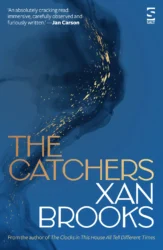 Xan Brooks is a freelance writer and broadcaster now specialising in cinema. He was an associate editor of The Guardian and, before that, a writer and editor at the Big Issue magazine. His first novel, ‘The Clocks In This House All Tell Different Times’ was published in 2017 and received a fair bit of critical acclaim.
Xan Brooks is a freelance writer and broadcaster now specialising in cinema. He was an associate editor of The Guardian and, before that, a writer and editor at the Big Issue magazine. His first novel, ‘The Clocks In This House All Tell Different Times’ was published in 2017 and received a fair bit of critical acclaim.
Brooks has imaginatively set his sophomore novel ‘The Catchers’ during the Great Mississippi Flood of 1927. He also weaves in the growing popularity of “hillbilly music” at that time. During the 1920’s several record label companies, such as Victor Talking Machine Company, Columbia, OKeh, and Brunswick started recording and selling hillbilly music. The invention of a weight-driven recording lathe, allowed song catchers to venture into Appalachia to carry out location recording sessions. Song catchers were driven to find the next song, the big fish, that would be re-recorded back in New York and sell by the bucket load.
Without giving too much away, John Coughlin is one of those songcatchers working for the fictional company Humpty Records. He has had some success as a catcher already. He is being sent to Appalachia, entrusted with a lathe, to source and record the local hill-country musicians. His assignment leads him to small-town Tennessee where he oversees a recording session that will enhance his reputation further. Here the first signs of exploitation and racism already begin to surface. From Sutton, Coughlin ventures further south in search of glory. Laid up at an old plantation house, Coughlin gets wind of a black teenage guitarist, Moss Evans, who works bootleg liquor in the Mississippi Delta. All the while, the river begins to dramatically flood, eroding the white status quo and bringing discrimination to the surface.
From this moment on it gets a bit bizarre. Coughlin decides to take the performer back to New York rather than recordings. The catcher and the catch pick their way across a ruined, unstable old south. And it is at this point, any empathy this reader had for the main protagonists began to ebb away.
Brooks does write beautifully. Visualisation of the landscape, the weather, the towns and the white-folk is effortless. As you read there’s a black and white movie playing in your head. But Brooks’ ability to characterise people of colour might not sit so comfortably with some. He has done some impressive background research into the flood of 1927 and the field recording equipment available at that time. There are a fair few social and moral points explored within the fiction. The ending leaves a lot to the reader’s imagination. Disappointingly, there are few real musical leads to go off and explore that help the reader soundtrack the story. Brooks does admit his book is historical fiction. Blind Moss Evans perhaps a composite character of legendary musicians such as Buddy Moss or Blind Boy Fuller.
So sadly, music does not jump out at you from the pages of this book. Still, this is a good story that would make an epic film. The chosen soundtrack would be interesting.


